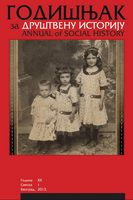„Касно дисидентство“ у Бугарској и крај владавине Тодора Живкова 1989. године
“Late Dissidence” in Bulgaria and the End of Todor Zhivkov’s Rule in 1989
Author(s): Vladimir TodićSubject(s): History
Published by: Udruženje za društvenu istoriju
Keywords: Todor Zhivkov; dissidents; Communist Party Bulgaria; Bulgaria; Gorbachev
Summary/Abstract: “Late dissidence” developed in Bulgaria as a consequence of decades of Todor Zhivkov’s authoritarian policy. Being connected to the USSR, he had adopted methods and patterns of action of security apparatus for preventing individuals and groups to act against proclaimed party and state principles. The appearance of Gorbachev in the world politics directly influenced the beginning of the process of olitical transition of power in Bulgaria. An inherent part of this process was the formation of the organizations of dissidents, predominantly made after the principles of perestroika. The most important themes for these organizations were democratization of the society, human rights and freedom of speech, as well as the environment protection. Bulgarian dissidents enjoyed, mainly in the media, the support from the USA and western European countries, a large number of international organizations. At the same time, facing severe isolation of Zhivkov from the international politics, high circles of the Bulgarian Communist Party decided to make a peaceful overturn, with open incitement and considerable diplomatic and intelligence support from Moscow. The Zhivkov’s fall and collapse of the communist regime marked the beginning of democratization of society and introduction of multi-party system in Bulgaria.
Journal: Godišnjak za društvenu istoriju
- Issue Year: 2013
- Issue No: 1
- Page Range: 31-53
- Page Count: 13
- Language: Serbian

